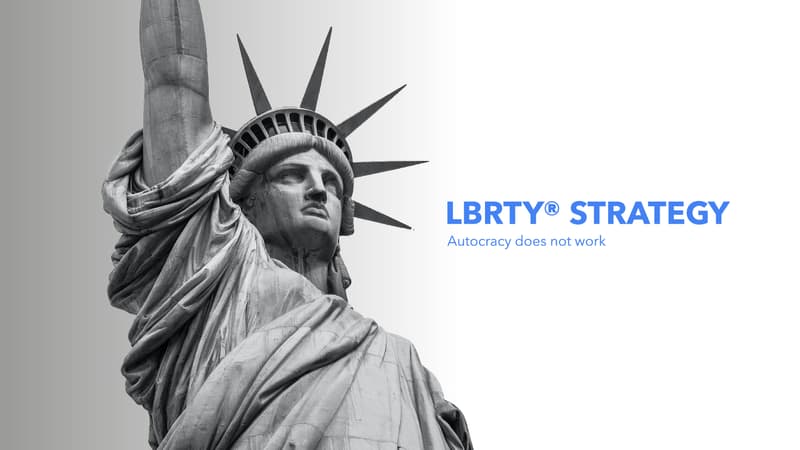TOBAM was born from a simple observation: that there was no measurement of diversification. A mathematician by training, I discovered the formula, now patented and also used in biology and botany. It is a true antidote to speculation. A few years later, our team of mathematicians naturally became interested in bitcoin. In 2017, with the agreement of the AMF, we launched the world’s first open fund invested in bitcoins. We then expanded our area of expertise to include a new strategy called LBRTY®, which aims to significantly reduce exposure to autocratic regimes and the associated risks for investors.
How was LBRTY, your investment strategy in democracy, born?
In 2009 we were in a meeting with my colleagues and I invited them to each choose a philanthropic cause. Two weeks later, everyone presented their project to me, including one who explained that the most educated country in Europe in 1930 was Germany. However, this did not prevent the country from producing one of the worst ignominies in history. Education is not enough. What would make it possible to eradicate dictators and authoritarian regimes? This is democracy and human rights. What’s more, it is an orphan cause. So we decided to make it our philanthropic cause. We proceed through tenders and redistribute up to 10% of our profits to human rights organizations. For example, we funded the opening of the Human Rights Watch office in Ukraine. The idea is also inspired by my personal experience. I lived in Lebanon until I was 18 years old. The successive crises that this country is going through owe a lot to autocracies… first to the Warsaw Pact, then to the Syrian regime and now to the Iranian regime. The cost of autocracy is colossal. In the 20th century there were 180 wars, among which only one was between two independent and democratic countries, Honduras and El Salvador. Choosing democracy is not just choosing good versus evil, but choosing what works versus what doesn’t work.
How is this done and how does it translate into performance?
History has shown that, in the long term, investors in companies exposed to authoritarian regimes run a risk that is negatively rewarded: they are exposed to the consequences of wars, the absence of the rule of law, expropriations caused by the State, social unrest, waste and corruption. In the long term, their performance is inferior.
We proceed in two steps: first we identify the autocracy risk factor, then we construct a portfolio that minimizes indirect exposure to autocracy. Most of the exposure to this risk is indirect: you don’t need to own Russian stocks to be exposed to Russia. If you own Société Générale, you lost 4 billion last year because of your exposure to Russia. Yale University has shown that more than 1,000 companies listed outside Russia have had to close their businesses in Russia, at a total cost of $240 billion!
The only way to correctly calculate exposure is to evaluate Beta. It is impossible to read on a bank’s balance sheet, for example, its exposure to oil. On the other hand, it is possible to calculate your Beta, this indicator is really effective. In France, we observe that Société Générale (0.1) is more exposed to the risk of “autocracy” than BNP Paribas (0.06).
TOBAM’s strategy therefore aims to minimize exposure to autocracy by a ratio of 7 to 1, compared to a reduction of 7 to 5 if only direct investments in non-democratic countries are excluded.
What do your clients think?
65% of TOBAM clients come from North America. For 6 years I observed that their attitude was changing towards the Chinese regime. In fact, it is less Americans than the Chinese regime that is changing. This transformation will be sanctioned by the markets. The more investors distrust Beijing, the more prices will fall for companies exposed to totalitarian countries. One of the problems of autocratic regimes is that they do not know how to manage economic crises.
What are your data sources?
Data exists in abundance. The V-Dem institute, for example, began publishing in 1789! It is now based at the University of Gothenburg, Sweden. More than 3,700 affiliated researchers feed their data on the “pillars of democracy”, which are pluralism, the functioning of the government, civil liberties, political participation, etc. We process these enormous amounts of information and construct a score for each country from 0 (North Korea) to 10.
Source: BFM TV


